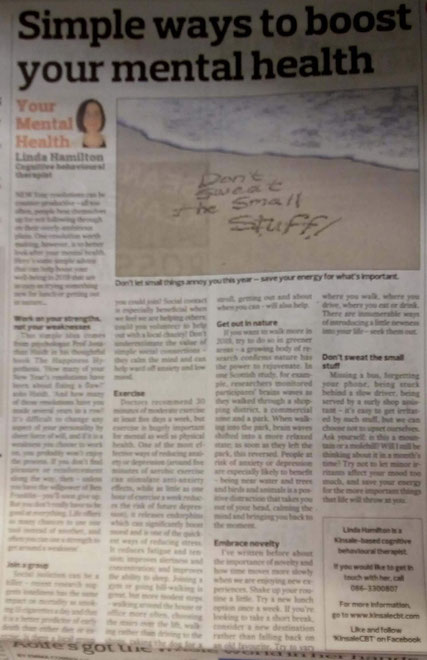
In last week's Southern Star, I offered some advice regarding New Year resolutions to boost mental health. The column is reproduced below.
Last week's Southern New Year resolutions can be counter-productive – all too often, people beat themselves up for not following through on their overly-ambitious plans. One resolution worth making, however, is to better look after your mental health. Here’s some simple advice that can help boost your well-being in 2019.
Work on your strengths, not your weaknesses
This simple idea comes from psychologist Prof Jonathan Haidt in his thoughtful book The Happiness Hypothesis. ‘How many of your New Year’s resolutions have been about fixing a flaw?’ asks Haidt. ‘And how many of those resolutions have you made several years in a row? It’s difficult to change any aspect of your personality by sheer force of will, and if it is a weakness you choose to work on, you probably won’t enjoy the process. If you don’t find pleasure or reinforcement along the way, then – unless you have the willpower of Ben Franklin – you’ll soon give up. But you don’t really have to be good at everything. Life offers so many chances to use one tool instead of another, and often you can use a strength to get around a weakness’.
Join a group
Social isolation can be a killer – recent research suggests loneliness has the same impact on mortality as smoking 15 cigarettes a day and that it is a better predictor of early death than either diet or exercise. Is there a local group you could join? Social contact is especially beneficial when we feel we are helping others; could you volunteer to help out with a local charity? Don’t underestimate the value of simple social connections – they calm the mind and can help ward off anxiety and low mood.
EXERCISE FOR MENTAL HEALTH
Doctors recommend 30 minutes of moderate exercise at least five days a week, but exercise is hugely important for mental as well as physical health. One of the most effective ways of reducing anxiety or depression (around five minutes of aerobic exercise can stimulate anti-anxiety effects, while as little as one hour of exercise a week reduces the risk of future depression), it releases endorphins which can significantly boost mood and is one of the quickest ways of reducing stress. It reduces fatigue and tension; improves alertness and concentration; and improves the ability to sleep. Joining a gym or going hill-walking is great, but more modest steps – walking around the house or office more often, choosing the stairs over the lift, walking rather than driving to the shops, taking the dog for a stroll, getting out and about when you can – will also help.
Get out in nature
If you want to walk more in 2019, try to do so in greener areas – a growing body of research confirms nature has the power to rejuvenate. In one Scottish study, for example, researchers monitored participants’ brains waves as they walked through a shopping district, a commercial zone and a park. When walking into the park, brain waves shifted into a more relaxed state; as soon as they left the park, this reversed. People at risk of anxiety or depression are especially likely to benefit – being near water and trees and birds and animals is a positive distraction that takes you out of your head, calming the mind and bringing you back to the moment.
EMBRACE NOVELTY
I’ve written before about the importance of novelty and how time moves more slowly when we are enjoying new experiences. Shake up your routine a little. Try a new lunch option once a week. If you’re looking to take a short break, consider a new destination rather than falling back on an old favourite. Try to vary where you walk, where you drive, where you eat or drink. There are innumerable ways of introducing a little newness into your life – seek them out.
Don’t sweat the small stuff
Missing a bus, forgetting your phone, being stuck behind a slow driver, being served by a surly shop assistant – it’s easy to get irritated by such stuff, but we can choose not to upset ourselves. Ask yourself: is this a mountain or a molehill? Will I still be thinking about it in a month’s time? Try not to let minor irritants affect your mood too much, and save your energy for the more important things that life will throw at you.